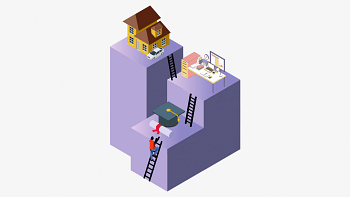Catching a break shouldn’t be this hard

There are times in life when you just need to sit down, take a break, and have a KitKat. Whether it be overwhelming work pressure or academic deadlines, being laser-focused for too long can prove counterproductive, and breaks can be a healthy way of coping with stress. However, as surprising as it may be, the older you get, the harder it is to slow down and relax for a bit.
Contrary to school, where even a mildly warm temperature warranted a week off, the reality is vastly different when you are in university or working. Being a university student or a young professional can mean you're expected to "hustle and grind", too often at the risk of your health and well-being.
There have been times in university when I've been very sick but still forced myself to attend classes, simply given that I would not be able to catch up with the academics I'd have missed if I had taken the break. Similarly, many friends of mine in the earlier stages of their careers not only have to sacrifice their health and well-being to show up but also spend considerable amounts of their free time occupied with work.
So this begs the question, why is it so hard to catch a break these days? The first thing to acknowledge is young adulthood and the host of new responsibilities that adulting comes with. Growing up can result in a negative work-life balance being formed, simply because it involves a difficult adjustment process to hectic schedules.
Being a full-time student at a university is vastly different from being in high school. A degree's sheer workload can leave you working till midnight and still behind schedule. Similarly, between getting ready and commuting back and forth, 9 to 5 jobs essentially take up a person's entire day, leaving them just enough time to get to bed and ultimately spend a couple of hours scrolling on their devices in an attempt to gain back some of the time from the day they have just lost.
As if the pressures of growing up weren't enough, the rise of social media, especially LinkedIn, filled with family members, friends, and acquaintances curating and parading their achievements only worsens things. While it should be understood that social media is a curated collection of people's very best, the sheer number of accomplishments others have on display can sound alarm bells internally and trigger panic and anxiety about falling behind.
This, in turn, disincentives us from taking a break and working on ourselves, which further leads people towards a burnout. There is also a deeply twisted but prevalent glamorisation of being overworked, aided by social media. Numerous people pride themselves on working overtime, wasting away at night studying or working, or working themselves so hard that they miss out on time with their friends or even give up longstanding hobbies just to get ahead.
Ultimately, it all boils down to us living in a very competitive world. Whether at school, university, or your job, life has unfortunately evolved into a fight for the survival of the fittest, with everyone grasping at whatever opportunity comes their way.
Culturally, this part of the world often holds one's value as directly proportional to one's talents and achievements. Thus, a large number wheelof people grew up thinking they are seen as valuable only when they have something to show for themselves. This ultimately fuels their self-doubt and a failure to equate their self-worth with intrinsic value, resulting in a toxic cycle of being constantly consumed with productivity, like a hamster in a wheel that it than evercannot get off or slow down.
However, circumstances are slowly but surely changing. More people understand now that the purpose of their life isn't labour. Fewer people attribute purely hard work to their job achievements, acknowledging that other factors, such as their position in the socioeconomic hierarchy, their network, and even their luck, are also at play. Gen Z and millennials are also a lot more concerned about their well-being and work-life balance, trying to fight against hustle culture despite how hard it is.
So next time you need a break, just take it. After all, you deserve it.
Taaseen Mohammed Islam is a student at NSU.
There are times in life when you just need to sit down, take a break, and have a KitKat. Whether it be overwhelming work pressure or academic deadlines, being laser-focused for too long can prove counterproductive, and breaks can be a healthy way of coping with stress. However, as surprising as it may be, the older you get, the harder it is to slow down and relax for a bit.
Contrary to school, where even a mildly warm temperature warranted a week off, the reality is vastly different when you are in university or working. Being a university student or a young professional can mean you're expected to "hustle and grind", too often at the risk of your health and well-being.
There have been times in university when I've been very sick but still forced myself to attend classes, simply given that I would not be able to catch up with the academics I'd have missed if I had taken the break. Similarly, many friends of mine in the earlier stages of their careers not only have to sacrifice their health and well-being to show up but also spend considerable amounts of their free time occupied with work.
So this begs the question, why is it so hard to catch a break these days? The first thing to acknowledge is young adulthood and the host of new responsibilities that adulting comes with. Growing up can result in a negative work-life balance being formed, simply because it involves a difficult adjustment process to hectic schedules.
Being a full-time student at a university is vastly different from being in high school. A degree's sheer workload can leave you working till midnight and still behind schedule. Similarly, between getting ready and commuting back and forth, 9 to 5 jobs essentially take up a person's entire day, leaving them just enough time to get to bed and ultimately spend a couple of hours scrolling on their devices in an attempt to gain back some of the time from the day they have just lost.
As if the pressures of growing up weren't enough, the rise of social media, especially LinkedIn, filled with family members, friends, and acquaintances curating and parading their achievements only worsens things. While it should be understood that social media is a curated collection of people's very best, the sheer number of accomplishments others have on display can sound alarm bells internally and trigger panic and anxiety about falling behind.
This, in turn, disincentives us from taking a break and working on ourselves, which further leads people towards a burnout. There is also a deeply twisted but prevalent glamorisation of being overworked, aided by social media. Numerous people pride themselves on working overtime, wasting away at night studying or working, or working themselves so hard that they miss out on time with their friends or even give up longstanding hobbies just to get ahead.
Ultimately, it all boils down to us living in a very competitive world. Whether at school, university, or your job, life has unfortunately evolved into a fight for the survival of the fittest, with everyone grasping at whatever opportunity comes their way.
Culturally, this part of the world often holds one's value as directly proportional to one's talents and achievements. Thus, a large number wheelof people grew up thinking they are seen as valuable only when they have something to show for themselves. This ultimately fuels their self-doubt and a failure to equate their self-worth with intrinsic value, resulting in a toxic cycle of being constantly consumed with productivity, like a hamster in a wheel that it than evercannot get off or slow down.
However, circumstances are slowly but surely changing. More people understand now that the purpose of their life isn't labour. Fewer people attribute purely hard work to their job achievements, acknowledging that other factors, such as their position in the socioeconomic hierarchy, their network, and even their luck, are also at play. Gen Z and millennials are also a lot more concerned about their well-being and work-life balance, trying to fight against hustle culture despite how hard it is.
So next time you need a break, just take it. After all, you deserve it.
Taaseen Mohammed Islam is a student at NSU.

 For all latest news, follow The Daily Star's Google News channel.
For all latest news, follow The Daily Star's Google News channel. 









Comments